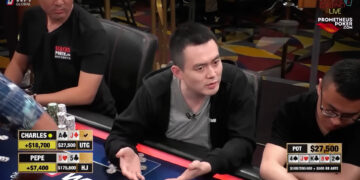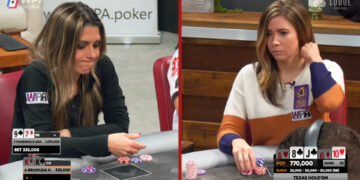I’m about to give you the real deal when it comes to living the life of a poker pro. I have noticed that most people who write about being a poker professional are not pros themselves. They base their articles on research. Therefore, in those cases, you’re getting second-hand and recycled information. What I’m about to write is 100% genuine as well as unique content. I’m telling you what it’s like to be a poker pro based on my experiences.
Poker Pro Swings

When you ask a poker pro the most challenging aspect of their profession, they will often say, “The swings.”
When things are good, man, you are really flying. You feel like you can conquer the world (not literally, of course). You’re making all the right decisions in cash games and Texas Hold’em poker tournaments and the money is flying in faster than you can keep track of it. And that, my friend, is where the trap is set.
Fortunately, I have learned from this error, but it was a painful lesson. After going on the biggest hot streak of my life, which was three final tables and one second final table in six WSOP Circuit events followed up by a 7th place of 2,373 for a lot of money, I thought I could cash in any tournament I played in. I always think back to one specific event in Choctaw, Oklahoma.
I had just arrived in Choctaw and played the Monster Stack. After grinding all day, I was in the money, but just barely. I was in cutoff with a relatively short stack (15 BB) and raised with KQ-off. The player on the Button (my biggest threat and the guy who ended up winning the whole thing) tanked, then put me all in.
At first, I thought he was just making a move, partially because he had a ton of chips and 15 BB wouldn’t hit him too hard. This was standard poker strategy because he’s likely going to take the blinds and ante money as well. Then I thought about it a little deeper.
This guy hadn’t said one word to anyone since I sat down, he played few hands yet played aggressively when he did play, and he handled his chips well. Would a player like this risk 15 BB for no reason? When I profiled him, it told me he was smart. Plain and simple. Would a smart player risk one of the blinds coming over the top and him having to fold? There was no way he would do that. He had to have been holding strength.
I don’t believe in: Think long, think wrong. I’m the complete opposite. I prefer to evaluate all variables and piece together the puzzle so I can figure out what’s going on and make the correct decision. In this instance, I made a terrible decision, but it wasn’t just based on poker hands.
The only reason I called was because I said to myself: I cash in poker tournaments all the time. If I lose this hand, I’ll just cash in the next one. Telling myself this was the biggest error I have ever made in my poker career. I had disrespected the game by underestimating my competition. NEVER DO THIS!
I lost that hand. He had AQ, which held. Since it was the first day of a five-day trip, I wasn’t sweating it. I figured I’d just win a few thousands in one of the next poker tournaments. As you might have guessed, I had zero cashes for the remainder of that week, and $5k went straight down the toilet.
To make matters worse, my next stop was Tunica. Despite taking second place in a Nightly for $2,995 on a $135 buy-in, I once again lost $5k for the week. Losing $10k in a matter of two weeks is not how you stay in business. On the other hand, I like to learn from my mistakes by adjusting and applying new strategies.
For example, since these two series, I now “only” bring $3k to a tournament series and leave my ATM card at home. If I run into an emergency, I can use my credit card. By bringing $3k, I accomplish two things: I minimize my losses and force myself to play better early in the week so I will still have cash available for the Main Event at the end of the week.
That downswing hurt, but in addition to the adjustments made above, it also lead to me winning three tournaments in one week at Coconut Creek about one month later. That’s because I respected the game again, stopped trying to outplay everyone, and allowed the game to come to me.
On that point, never force the action. If you do that, you’re going to end up losing. Remember these words: Do not go to the game, let the game come to you. You don’t need to know what that means specifically in regards to poker hands and poker strategy. You will figure it out, I promise.
How many people can handle losing $10k in a matter of weeks? A lot depends on your bankroll, but I don’t care who you are, nobody is going to be happy losing $10k in a matter of weeks. These are the kinds of downswings a poker pro must deal with, and that loss doesn’t account for traveling expenses. I might get free or discounted rooms sometimes, but nobody is going to pay for my gas or food while traveling to my destination. And nobody is going to pay for my airfare or airport parking, which are also big expenses.
Despite this hit, I didn’t get emotional. That’s the key! I knew I had something as a poker player, perhaps something a little different. Maybe not better than everyone else, but different than everyone else, and different can win in this game because nobody can figure you out. The three wins in Coconut Creek put me back on track, and I followed that up with two final tables in two attempts at Pearl River. Following that, I hit another downswing, which I’m pretty sure I’m just coming out of now.
The swings don’t matter once you’re a true poker pro. It’s just like poker hands. Are you going to get emotional after a loss or stay calm and remind yourself that you’re a+ player. Since my poker year runs August-August and I’m not playing again until early August, I ran my numbers for the year. I finished comfortably (not amazingly) on the plus side. That’s what matters.
No matter who you are, there will be swings. An amateur or a pretend poker pro will not be capable of handling these swings. A poker pro will, and he/she will make adjustments for improvements in the following year. Make sure you fall into that category.
Poker Pro Traps

I’m not talking about a check-raise here. I’m talking about the off-the-felt traps for any traveling poker professional. The following is more valuable than most poker tips I write about, so pay attention.
If you travel to play in Texas Hold’em poker tournaments (and sometimes cash games), you’re going to be tempted by many things. I’m sure you can figure out what some of those things are, but in case you can’t, they are drugs, alcohol, and women.
As far as drugs go, if I know someone on the Circuit is in that world, I steer very clear of them. There is no faster way to go out of business at the poker table than by using drugs. A few people have become addicted to their habit, which means their priority is drugs, not poker. That’s wasting a ton of buy-ins as well focus. This is way less than 1% of poker players on the Circuit, so don’t get the wrong idea. They are definitely the rare exception, not the rule, but there are a few out there.
Alcohol is a much bigger problem. I’d say about 10% of players on the Circuit go out drinking on a regular basis. These are sometimes very good players. I think the amount of energy they put out during poker tournaments leads to them needing a release, which comes in the form of alcohol.
While I enjoy a drink once in a while, I know that if I were to get involved in that world, it wouldn’t stop. You waste a lot of money and sleep in that environment, both of which will hurt the bottom line for a poker professional. I understand exerting all that energy in Texas Hold’em poker tournaments is draining. I deal with it by going to the gym opposed to drinking. This gives you energy again and helps you sleep.
As far as women are concerned, everyone likes attention. I’m one of those people. However, there is a big difference between harmless flirting and getting too attached. If you choose to become a poker pro, make sure you keep it to the former. If you end up going with the latter, you’re going to lose your mojo at the poker table. Translation: Your mind won’t be on poker.
Staking, Lending, Borrowing as a Poker Pro

My general rule is that I don’t stake, lend, or borrow money, and other poker pros know that. I do have one long-term deal with an investor, but it’s more for fun. He’s getting 1% of my cashes for a year, but it’s more about him following my journey and living vicariously through me. The real staking world is different.
I can’t tell you how many times someone has scored big and not paid their investors. It happens constantly. I don’t know why this happens, but my best guess is that the winner has more debt obligations than we know about. This leads to an angry investor and a ruined reputation for the player.
No one is going to trust that player again once the word is out, and these players are often called out to the poker world on social media. The other staking option is to use a staking site, but they take a fee. Therefore, in addition to paying investors and taxes, you’re also paying a fee. That doesn’t leave much room for profit.
There is one way to do it. If you want to find a stake, do it on social media so there is no fee. By doing it publicly, you will also be putting your reputation on the line. In other words, you will be sure to pay your investor(s) if you score.
As far as lending money and borrowing money, hell no! Never lend money to anyone in the poker community. You will never see it again. I have had several people ask me for money. If they ask me in person, I tell them I don’t have any cash on me. It’s an obvious lie to both parties, but it’s also a polite way of saying no. And borrowing money? If you need to borrow money, you’re in the wrong game. If you’re looking to borrow money in this community, then it’s likely not for poker. People will pick up on that, so don’t try it.
In my opinion, basic poker rules for poker pros are to play your own money and to never lend or borrow money to anyone.
Final Thoughts
There are many different types of poker tips above. If it seems overwhelming, just remember to stick to the basic poker rules: respect the game, minimize expenses, stay away from temptations, and steer clear of staking, lending, and borrowing money. If you can follow those rules, you’ve got a shot.
♠ pokerjournal.org
Poker Pro – FAQ
How much does a pro poker player make?
That depends on the poker player, the stakes they are playing, their money management and their endorsements.
Can you make a living playing poker?
Yes, but you must also be smart off the felt as well.
How do you become a pro poker player?
You don't need to fill out an application. It's self-declared. IRS definition: most of your income comes from playing poker.
Is poker a good career?
If you're just playing poker, it's going to be tough with so many distractions – table games, alcohol, lifestyle, but it's definitely possible. If you're business savvy, then yes.

















Discussion about this post